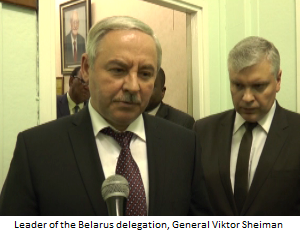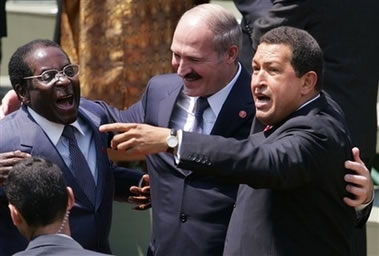Wars in Syria and Ukraine Make Belarus More Important

Qatar's Defence Minister in Minsk. Image: Vayar News Agency.
After the Turkish downing of a Russian aircraft in Syria last month, Minsk refused to join Moscow in its accusations and recriminations against Ankara. It just lamented what happened between its “Russian ally” and “friendly Turkey.” Needless to say Minsk has also not supported any of the Russians sanctions imposed on Turkey.
Belarusian state media openly doubt Moscow's version of what is going on in Syria. That has not gone unnoticed in the Kremlin. Evgeny Satanovski, a political commentator close to the Russian government, puts Belarus alongside Qatar and Turkey as a country which opposes Russia's policies.
Why does Minsk risk challenging Moscow again? It calculates that the new international situation and, above all, the changed geopolitical significance of Belarus enables Minsk to play its own games. After all, Belarus has improved its relations with the West and after the Russo-Turkish war of words it has become the safest route for gas transit between Russia and the EU.
Pro-Western Friends of Minsk in the Middle East
Actually, Minsk has undertaken its own political line in regards the Middle East over the past decade. Since the early 2010s, it shifted its focus away from the radical regimes of Iran, Syria and Libya to conservative regimes allied with the West.
At the height of the Syrian civil war Minsk welcomed the then Turkish foreign minister Ahmet Davutoglu Read more
The Belarusian regime focused its attention on Qatar, the UAE, Oman and also Turkey. At the height of the unrest in Libya, leading to the toppling of an old Belarusian partner, Muammar Qadhafi, Lukashenka headed in summer 2011 for the country which stood behind the Libyan uprising, Qatar. At the height of the Syrian civil war Minsk welcomed in spring 2013, the nemesis of the Kremlin and Damascus, then Turkish foreign minister Ahmet Davutoglu and later sent high-level officials to meet Davutoglu in Ankara.
Minsk's activities in recent months are merely a less spectacular continuation of existing diplomacy. In the absence of serious contacts with Tehran, or Damascus the Belarusian government preferred deals with their opponents.
On Sunday, the French web-site, Intelligence Online, reported that Moscow had to step in and halt Minsk selling the UAE some military aircraft. These would be used to train against Russian and Iranian airforces which use similar types of planes. This is illustrated by the speaker of the upper chamber of the Belarusian parliament, Mikhail Myasnikovich, who in October described relations between Minsk and Abu Dhabi as “among all the countries of the Persian Gulf, it is the United Arab Emirates with which we have managed to establish the longest, most confidential and large-scale relations.”
Also in October, Minsk welcomed a trade delegation from Iraqi Kurdistan, whose pro-American regime is clearly disliked by Moscow and its allies in the region. In September, a prominent Lebanese businessman and pro-Western politician, Adnan Kassar, visited Belarus to meet top officials, including foreign minister Uladzimir Makei. Kassar has business in the country, but he most probably also facilitated contacts for Minsk in the conservative Persian Gulf regimes.
Evgeni Satanovski wrote an article accusing Minsk of secretly playing against Russian policy in Syria. Read more
Finally last week the Kremlin reacted openly. Russian political commentator Evgeni Satanovski wrote an article accusing Minsk of secretly playing against Russian policy in Syria. He included Belarus in the “Alliance of Backstabbing Nations”, together with such patented opponents of Moscow like Qatar, the UAE and Turkey.
Satanovski, who has recently changed his image from an analyst of purely Middle Eastern affairs to a commentator on any political issue, acts as a mouthpiece for at least a part of the Russian regime. The high-level propaganda shows and programmes on Russian TV, especially those anchored by Vladimir Solovyev, feature him regularly speaking in a pro-Kremlin rhetoric.
Minsk Derides Moscow's Accusations against Erdogan?
The facts which Satanovski quoted are clearly not a smoking gun. He referred to the visit of Qatar's defence minister to Minsk in July, and the probable personal involvement of the ambassador of the UAE in getting an arms deal with Minsk. Minsk undoubtedly perceived the article as a stern warning, knowing the author's proximity to the Kremlin. The text itself initially appeared in a specialised periodical, the Military Industrial Courier, which is widely read by Russian politicians, before Vzglyad republished it.
Belarus Segodnya, published a brief, yet harsh, criticism of Russian accusations concerning the Turkish government Read more
On 4 December, the web-site of the main Belarusian government media outlet, Belarus Segodnya, published a brief, yet harsh, criticism of Russian accusations concerning the Turkish government's involvement in smuggling oil with Islamic State.
Formally, the article appeared as a blog entry, yet this official daily strictly controls everything that appears on its web-site, so it is not just a private opinion. Furthermore, the author, Yury Tsaryk, is closely connected to the Belarusian government and is known as a strategist and thinker of a pro-Western faction in the regime.
The New Geopolitical Situation of Belarus: Risky yet Favourable
Minsk clearly feels more confident pursuing its own policy which differs from the Russian. This is not only due to the improvement of relations between Belarus and the EU. Belarus finds itself in a new geopolitical situation and is working effectively in it.
On the one hand, Belarus managed to play some role in negotiations on Ukraine and through that the regime overcame its own international marginalisation. Now, it continue its attempts to become a recognised place for international negotiation. It follows the urgent visit of Azerbaijani president, Ilham Aliyev, on 27-28 November which probably was about possible mediation between Russia and Turkey over their clash in Syria.
Belarus now offers the safest and arguably the best route for an additional Russian gas pipeline Read more
Lukashenka has a chance to succeed in that endeavour. The state secretary of the Union State of Belarus and Russia and Russian General Grigory Rapota, recently discussed the possibility of Belarus as a negotiation centre on the Middle East. By that they also arguably meant the latest conflict between Moscow and Ankara.
On the other hand, Belarus's geopolitical situation changed after the beginning of the Ukrainian war and the Kremlin's conflict with Turkey. The significance of Belarus as a route for transport of Russian oil and gas to Europe has increased. Essentially, Belarus now offers the safest and arguably the best route for an additional Russian gas pipeline.
It means Belarus becomes a more valuable partner for Russia and the EU. That means Minsk can afford more leeway in dealing both with Russia and EU and profit from this situation. Sure, the situation is not risk free. At the same time Belarus, as a transit country for gas supplies between Russia and Europe is in competition with other countries, business interests and radical groups in the region.
This risk is the price for the transformation of the country from Europe's backwater to a more active and accepted player in international politics. Not everything depends on Belarus however. The recent moves by Minsk (its position on Syria or the Russian military presence in Belarus) demonstrates, however, its aspiration to use the new geopolitical reality and build up Belarusian independence and effective neutrality.




 In Harare, Viktor Sheiman also signed a joint venture agreement for the extraction of gold and other precious minerals with the Zimbabwean mining minister and the Reserve Bank’s governor.
In Harare, Viktor Sheiman also signed a joint venture agreement for the extraction of gold and other precious minerals with the Zimbabwean mining minister and the Reserve Bank’s governor. In January 2005, at a Senate Foreign Relations Committee confirmation hearing for the future US Secretary of State, Condoleezza Rice specifically identified Belarus and Zimbabwe (alongside Myanmar, Cuba, Iran and North Korea) as the “
In January 2005, at a Senate Foreign Relations Committee confirmation hearing for the future US Secretary of State, Condoleezza Rice specifically identified Belarus and Zimbabwe (alongside Myanmar, Cuba, Iran and North Korea) as the “ A relative breakthrough happened in 2014 when BelAZ, a Belarusian manufacture of quarry machinery, supplied 17 units of its equipment (dump trucks, loaders and bulldozers) to Hwange Colliery coal mine in Zimbabwe. The machinery was supplied through a vendor financing scheme secured by the regional PTA Bank.
A relative breakthrough happened in 2014 when BelAZ, a Belarusian manufacture of quarry machinery, supplied 17 units of its equipment (dump trucks, loaders and bulldozers) to Hwange Colliery coal mine in Zimbabwe. The machinery was supplied through a vendor financing scheme secured by the regional PTA Bank. Belarus agreed to
Belarus agreed to 
